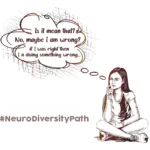Do you ever find yourself wondering how to navigate the complexities of dating someone with ADHD? It’s common to feel overwhelmed or unsure about how to support your partner while caring for yourself. But fear not! In today’s post, we’re diving into eight invaluable suggestions to help you strengthen your relationship and foster understanding with your ADHD partner. From communication strategies to practical tips for managing daily challenges, this post promises to equip you with the tools and insights you need to thrive together. So, if you’re ready to deepen your connection and build a more fulfilling relationship, keep reading. You won’t want to miss out on these transformative suggestions!

1- Understanding ADHD in Relationships: A Guide for Partners
Navigating a relationship with a partner who has ADHD requires a deep understanding of the condition’s dynamics. ADHD isn’t just about attention struggles; it influences various aspects of daily life, including emotions, organization, and impulsivity. Partners may notice patterns of forgetfulness, inconsistency, or difficulty in following through with plans or responsibilities.
Educating yourself about ADHD is the first step toward offering effective support. Learn about the symptoms and challenges associated with ADHD, and understand that they are not intentional behaviors. Recognizing how ADHD manifests in your partner can foster empathy and patience, laying the foundation for a stronger, more supportive relationship.
2- Communication is Key: Navigating Conversations with Your ADHD Partner
Open and Honest Dialogue
Effective communication is the cornerstone of any successful relationship, especially when one partner has ADHD. Be proactive in initiating open and honest conversations about how ADHD affects both of you. Encourage your partner to share their experiences and feelings without judgment.
Active Listening
Practice active listening during conversations with your ADHD partner. This means giving them your full attention, maintaining eye contact, and validating their feelings. Avoid interrupting or finishing their sentences, allowing them the space to express themselves fully.
Clarify and Confirm
Clarify and confirm important points during discussions to ensure mutual understanding. Repeat what you’ve heard and ask for clarification if needed. This can prevent misunderstandings and promote clearer communication between you and your partner.
Set Realistic Expectations
Set realistic expectations for communication with your ADHD partner. Understand that they may struggle with impulsivity or forgetfulness, leading to occasional communication hiccups. Be patient and flexible, and work together to find communication strategies that suit your needs.
3- Patience and Empathy: Essential Ingredients for a Successful Relationship
Cultivating Patience
Patience is essential when navigating a relationship with an ADHD partner. Understand that managing ADHD symptoms takes time and effort, and progress may not always be linear. Practice patience during challenging moments, and avoid placing unrealistic expectations on your partner.
Empathetic Understanding
Empathy plays a crucial role in fostering connection and support in your relationship. Put yourself in your partner’s shoes and acknowledge the daily struggles they face due to ADHD. Validate their experiences and emotions, offering a safe space for them to express themselves without fear of judgment.
Celebrate Progress, Big and Small
Celebrate your partner’s progress, no matter how small. Recognize their efforts and achievements, reinforcing positive behaviors and building their confidence. Your encouragement and support can go a long way in boosting their self-esteem and strengthening your bond as a couple.
4- Practical Tips for Managing ADHD Challenges Together
Establishing Structure and Routine
Creating structure and routine can help both partners manage ADHD challenges more effectively. Set a daily schedule together, including specific tasks, meals, and relaxation times. Consistent routines can reduce stress and overwhelm for your ADHD partner, providing a sense of predictability and stability.
Utilizing Visual Aids and Reminders
Visual aids and reminders can be invaluable tools for managing ADHD-related forgetfulness and disorganization. Use calendars, to-do lists, and color-coded schedules to keep track of important events and tasks. Encourage your partner to set alarms or use smartphone apps for reminders. These visual cues can help them stay on track and focus throughout the day.
Collaborating on Problem-Solving
Work together as a team to problem-solve and find practical solutions to ADHD challenges. Brainstorm strategies for managing common issues such as time management, impulsivity, or distraction. By collaborating and supporting each other, you can find creative ways to navigate ADHD-related obstacles and strengthen your relationship.
5- Creating Structure and Routine: Supporting Your Partner’s ADHD Needs
Establishing Consistency
Consistency is key when creating structure and routine to support your partner’s ADHD needs. Research conducted by Dr. Russell Barkley at the Medical University of South Carolina emphasizes the importance of consistent routines in managing ADHD symptoms. Set clear expectations and stick to established routines to minimize stress and confusion for your partner.
Designating Specific Spaces
Designate specific spaces for different activities to help your partner stay organized and focused. Create a designated workspace for tasks that require concentration, free from distractions. Similarly, designated relaxation and leisure activities areas should be established to promote a healthy work-life balance.
Flexibility and Adaptability
While structure and routine are important, maintain flexibility and adaptability to accommodate your partner’s changing needs. Be open to making adjustments to routines or schedules as necessary, and communicate openly about any challenges or obstacles that arise. By remaining flexible and responsive, you can create a supportive environment that empowers your partner to thrive despite ADHD-related challenges.
6- Self-Care for Partners: Balancing Support with Personal Well-being
Prioritizing Self-Care
Prioritizing self-care is essential for partners of individuals with ADHD to maintain their own well-being. Research by Dr. Andrea Chronis-Tuscano at the University of Maryland highlights the impact of caregiver stress on relationship satisfaction and mental health. Make time for activities that recharge and rejuvenate you, whether exercising, hobbies, or spending time with friends.
Setting Boundaries
Setting boundaries is crucial for balancing support for your partner with your personal needs. Establish clear boundaries around responsibilities and self-care practices, and communicate them openly with your partner. Remember that asking for help or taking breaks is okay when needed. Setting and maintaining boundaries promotes healthy relationship dynamics and ensures that both partners’ needs are met.
7- Embracing Differences: Celebrating Unique Qualities in Your Relationship
Appreciating Individual Strengths
Embracing differences and celebrating unique qualities in your relationship can strengthen your bond. Recognize that ADHD brings its own set of strengths, such as creativity, spontaneity, and resilience. Appreciate and acknowledge these strengths in your partner, fostering a sense of mutual respect and admiration.
Fostering Growth Mindset
Maintain a growth mindset in your relationship, focusing on learning and growth together. Rather than viewing ADHD-related challenges as obstacles, approach them as opportunities for personal and relational development. Encourage your partner to embrace their strengths and work collaboratively to overcome any obstacles that arise.
Cultivating Acceptance and Understanding
Cultivate acceptance and understanding in your relationship, recognizing that everyone has their own unique strengths and challenges. By embracing your partner’s differences and supporting them unconditionally, you can create a relationship built on love, acceptance, and mutual respect. Celebrating each other’s unique qualities strengthens your bond and fosters a deep connection.
8- Seeking Professional Support: Resources for Couples Dealing with ADHD
Professional Guidance
Seeking professional support can be invaluable for couples navigating the challenges of ADHD in their relationship. Consider seeking therapy or counseling with a mental health professional who specializes in ADHD and relationship dynamics. Research by Dr. Robin West at the University of Florida emphasizes the effectiveness of couples therapy in improving relationship satisfaction and communication skills for couples affected by ADHD.
Accessing Supportive Resources
Accessing supportive resources can provide additional guidance and assistance for couples dealing with ADHD. Organizations such as CHADD (Children and Adults with Attention-Deficit/Hyperactivity Disorder) offer resources, support groups, and educational workshops tailored to couples and families affected by ADHD. Online forums and communities provide opportunities to connect with other couples facing similar challenges, offering a sense of solidarity and shared experiences.
“Love is not about how many days, months, or years you have been together. Love is about how much you love each other every single day.”
– Unknown
In conclusion, navigating a relationship with a partner who has ADHD requires patience, understanding, and proactive communication. By embracing differences, prioritizing self-care, and seeking professional support when needed, couples can cultivate a strong and resilient bond. Remember to celebrate the unique strengths that ADHD brings to the relationship and approach challenges with a growth mindset. As you embark on this journey together, remember it’s okay to ask for help and support each other unconditionally. Reflecting on this article, I’m reminded of the importance of empathy and acceptance in fostering a loving and supportive partnership. You can overcome obstacles and build a relationship grounded in mutual respect and admiration.
What are your thoughts on navigating relationships with ADHD partners? Share your experiences and insights in the comments below. Your feedback and contributions enrich our community’s collective wisdom.





